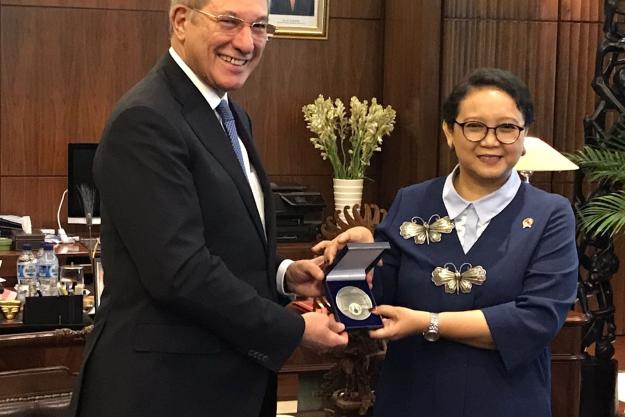
OPCW Director-General Ahmet Üzümcü (left) and Minister of Foreign Affairs of the Republic of Indonesia, H.E. Retno L.P. Marsudi.
THE HAGUE, Netherlands — 28 July 2017 — The Director-General of the Organisation for the Prohibition of Chemical Weapons (OPCW), Ambassador Ahmet Üzümcü visited Indonesia on 27 and 28 July where he met with Minister of Foreign Affairs of the Republic of Indonesia, H.E. Retno L.P. Marsudi; Minister for Industry of the Republic of Indonesia, H.E. Airlangga Hartato; as well as representatives of the Indonesian National Authority, Indonesian Institute of Sciences, Responsible Care Indonesia and Federation of Indonesian Chemical Industry.
The Director-General’s discussion with the Indonesian Minister of Foreign Affairs, on 27 July in Jakarta, focused on the accomplishments and challenges related to the implementation of the Chemical Weapons Convention, including OPCW activities in facilitating international cooperation and technological development of OPCW Member States and the increasing need to address the issues posed by non-State actors acquiring chemical weapons.
At a webinar hosted by the Indonesian Institute of Sciences, the Director-General recalled that the Chemical Weapons Convention – in force for 20 years now – is a “science-based treaty, and scientific knowledge and expertise have played no small part in defining our work and contributing to our success”.
He noted that although “we watch new scientific discoveries with fascination”, we have to be mindful of the potential of scientific achievements being misused to “inflict destruction upon us and our ways of life”. The Director-General warned that ethics must keep pace with technology. “Only through establishing universally recognised principles and norms can we ensure that ethical and legal norms will be widely recognised and respected,” he concluded.
Ambassador Üzümcü toured the Research Center for Chemistry in Serpong, on 28 July, and gave a lecture that further underlined the responsibility of scientists in achieving a world free of chemical weapons.
The Director-General also had a working lunch with ASEAN Permanent Representatives where he briefed them on the OPCW and opportunities for regional organisations to establish Chemical Weapons Convention capacity-building hubs.
Background
Indonesia ratified the CWC in 1998 and has been an active supporter of the Chemical Weapons Convention.
As the implementing body for the Chemical Weapons Convention, the OPCW oversees the global endeavour to permanently eliminate chemical weapons. Since the Convention’s entry into force in 1997 – with its 192 States Parties – it is the most successful disarmament treaty eliminating an entire class of weapons of mass destruction.
Ninety-five per cent of all chemical weapon stockpiles declared by possessor States have been destroyed under OPCW verification. For its extensive efforts in eliminating chemical weapons, the OPCW received the 2013 Nobel Prize for Peace.
More Information
- Webinar Lecture “Ethics in Science” by Ambassador Ahmet Üzümcü, OPCW Director-General, Indonesian Institute of Sciences, Jakarta, 27 July 2017
- OPCW Fact Sheets
